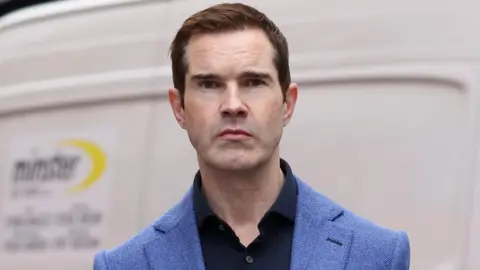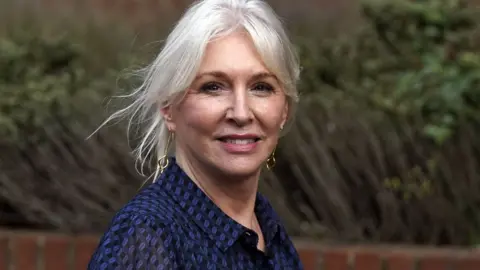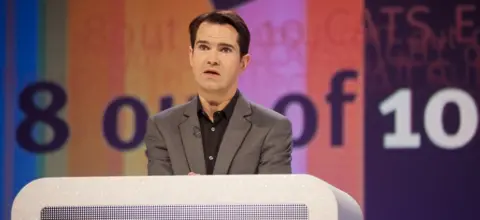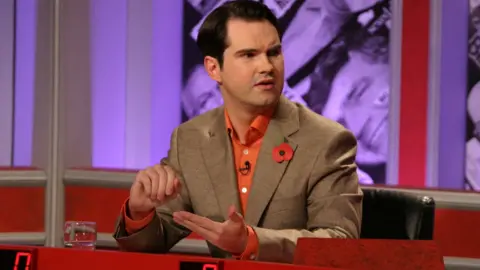Jimmy Carr: Pressure grows over comedy routine but what do the fans think?
 Getty Images
Getty ImagesOn Sunday, comedian Jimmy Carr told an audience in Manchester that it might be his last tour, after the controversy around comments he made about the Holocaust in his Netflix special, His Dark Material.
Carr is under fire for joking that "nobody talks about the positives" in reference to the Nazi murders of hundreds of thousands of people from the Roma, Sinti and traveller communities.
On Monday, the prime minister's official spokesman said it was "unacceptable to make light of genocide", adding that the government will be "making sure the streaming services are more accountable".
The Traveller Movement charity is also drafting a complaint to Netflix demanding it remove that section from the programme, the BBC understands.
Netflix have not yet commented on the furore, but many of his fans have defended him. Some argue that, even while they may not defend the joke, they defend his right to tell it.
Nikki Eastwood, who is 29 and from Manchester, went to the stand-up's live show on Sunday and told the BBC: "He said 'This might be my last tour because I'm getting cancelled', or something like that. People laughed."
So, can a comedian deliberately end their career with an offensive joke? That's almost the starting point for Jimmy Carr in His Dark Material.
He begins with a trigger warning, telling the audience "tonight's show contains jokes about terrible things", explaining that "these are just jokes, not the terrible things".
Carr continues an hour-long routine that riffs on, amongst other controversial topics, paedophiles, ugly women, rape, disability and veganism. All vintage Carr. While his fans adore his near-the-knuckle humour, others would find many of these jokes offensive.
 PA Media
PA MediaFive minutes before the end of the show, he turns to a subject he says "should be a career ender". Carr then proceeds to tell the joke which has now been widely reported and condemned.
The show has been widely streamed on Netflix since Christmas Day. But it was only when a clip was shared on social media recently that the storm erupted.
Culture Secretary Nadine Dorries called it "abhorrent" and said new legislation would ensure companies like Netflix would be held to account.
The BBC understands the Traveller Movement and other civic organisations are finalising a letter to Netflix requesting it remove the segment from His Dark Material. They also want the streamer to answer how that part of the show made it to release without anybody pushing back and asking Carr to take it out.
Greg Sproston, policy and campaigns manager at The Traveller Movement told the BBC on Monday: "If you've got a punchline to a joke which is indistinguishable from the genuinely held beliefs of Nazis and fascists, a line has been crossed.
"There's only one interpretation: that the genocide of Roma and Sinti people was a positive thing. Others have suggested it's hate speech. We want to see accountability. We want to see Jimmy apologise to the community and understand the hurt and offence he has caused."

Some believe that Carr has crossed a line, as he's picked on a community that is too often marginalised. They argue that those words, as a standalone, feel brutal, discriminatory, unfunny and indefensible.
But is there a difference when the words are taken as part of an hour-long set in which Carr specifically makes clear, from the outset, that he's going to be offensive and then frames the joke within the context of "career enders"?
After telling the joke, Carr explains why he thinks it is valid. He claims it's "funny" and "edgy" because it's about "the worst thing that's ever happened in human history" which we should "never forget".
He also says there is an "educational quality" to raising it, as people know the Nazis murdered Jews, but they don't know, claims Carr, they also killed gypsies and other groups.
Sproston accepts the headlines made around Carr's comments have raised awareness about the murders of Roma and Sinti people in World War Two but adds: "I don't think that was his intention. It doesn't speak to any genuine attempt to raise awareness on his part. There's very little room for interpretation in this joke. He's saying genocide is to be celebrated."
Carr's defenders say, whether the joke is inappropriate or not, this isn't the comedian's actual opinion, but an example of the worst sort of thing one could possibly say as part of a routine about exactly that.
Last year I spoke to Dame Maureen Lipman who voiced her fears that comedy is in danger of being "wiped out". She claimed comedians tone down their material because they worry audiences will take offence and demand they are cancelled. Dame Maureen argued "something has to be forbidden to make you laugh… It's when you shouldn't be laughing".
This episode has reignited these arguments. What does the Jimmy Carr story tell us about doing challenging comedy in the age of cancel culture? What hasn't happened so far is the so-called cancellation of Jimmy Carr, but he's certainly under fire.
His show is still available on Netflix, which told the BBC it wouldn't comment on the furore. His ongoing tour, Terribly Funny, is sold out at most venues around the UK.
People who have bought those tickets know what they're going to get. The comedian makes no secret about his style of comedy. He purposely pushes boundaries and tells offensive jokes.

During an interview with the BBC in October, Carr said it's all about context.
"I think there's a huge difference between telling a joke on stage at 11pm and shouting it through someone's letterbox at 9am," he told my colleague Steven McIntosh.
"And when stuff is written in the papers, it looks pretty harsh, but there's no delivery, so you take away the context…. It's nuanced, it's the tone, it's the timbre of the speech, there are so many other things going on in language that aren't just the words that are being said."
Nikki Eastwood was at Carr's show at the Bridgewater Hall in Manchester on Sunday night. She said "all the jokes were horrendous but funny, and very very Jimmy Carr". Although he didn't repeat any jokes about Travellers, he did go through jokes about rape, Islam, paedophiles and others, she said.
"I went with my Dad. We both thought he maybe went a bit too far with the rape jokes, it was too much. I think he wants to make a point that you shouldn't be cancelled for jokes. His whole point is he takes the mick out of everyone and everything, he's not being discriminatory."
Jessica Toomey runs the Frog and Bucket comedy club in Manchester. She told the BBC: "I don't like the joke, but it's a joke. He's purposely trying to push the boundaries."
She added that, although Carr hasn't done a gig at her club for nearly two decades, "if he rang me up tomorrow and said 'could I jump on your stage?', I'd say yes. But I'd make clear to the audience they were coming to see Jimmy Carr. I wouldn't just spring his offensive style on an unsuspecting audience.
"The argument is, if you don't like it, don't watch it. I don't defend the joke, but I defend his right to say it."
